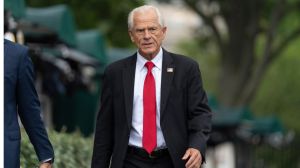Resource full
Russia, Iran, Venezuela want to control oil. That makes foreign policy tougher

Oil prices are not independent of supply, as the reaction of the markets to the conflict in Georgia made clear. More important, oil prices are nowhere near independent of fears about the disruption of supply 8212; not because of speculation, but because of market-driven responses attempting to curb risks, and because companies frequently shut down assets in threatened areas, such as BP did to its pipeline in Georgia. It is a popularly held belief that the Iraq war was about oil; the same people who believe that are a lot less likely to say it about the Russia-Georgia conflict, where it is considerably truer. When Russian missiles whistled into Georgia, they were targeted at, among other things, crucial infrastructure supporting the three great pipelines which connect the rich oil and gas fields of the Caspian to the Black Sea and Turkey. These pipelines were out of Russia8217;s control; when Putin went ballistic, he wanted to show Europe that it couldn8217;t depend on them as a steady source.
This affects Indian national interests, and those of Indian companies, adversely, and in different ways. The broader problem is that, as an energy-hungry growing economy, India needs access to the natural resources of Central Asia, independent of Russian or Iranian influence; our dependence on Russia as a military supplier already constrains our foreign policy. More narrowly, it means that we will have to back up our companies once their investments have been made; the MEA will have to play in the big leagues now. It8217;s good to know that the Kazakh petroleum minister will be in Delhi discussing this on Sunday, and that the MEA has fast-tracked CICA, which builds relationships with Central Asia.
This problem will not go away as long as prices are high. Across the world, resource nationalism is coming into prominence, as countries nationalise or attempt to control the resources in their sphere of influence. The vast majority of oil reserves remaining are nationally owned, a large proportion of them in countries that do not permit foreign investment. State-owned petroleum companies, seen as extensions of their countries8217; foreign policies in some cases, and as cash cows in others, are taking over the industry. From a global point of view, this might well be disastrous; in particular, they massively under-invest in new exploration and pipeline security, thus mortgaging the future of the industry for the short-term benefit of their political masters. In Venezuela, oil funds Chavez8217;s quixotic foreign policy; in Russia, it funds Putin8217;s authoritarianism at home. In neither case is the industry open to foreigners; in both cases, domestic investment is insufficient to keep the industry going. No wonder Putin wants to show that Europe and South Asia8217;s energy security depends on him. As OVL buys Imperial, as ONGC-Mittal negotiates with PetroKazakh, let our cheers be tempered with this knowledge.
- 01
- 02
- 03
- 04
- 05































